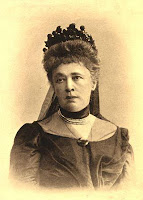 |
| Bertha von Suttner (Photogravure, ca 1900) |
Bertha von Suttner entered into life as an impoverished aristocrat born in Prague, then Austro-Hungarian Empire, now Czech Republic, in June 1843. Her education was suitable to her station and comprised above all languages and music, but her hopes to make a suitable match were small considering the family’s financial situation. At the age of 30 she thus left home and her mother in order to make her own living as a governess to the four girls of the rich von Suttner family in Vienna. The youngest son, Arthur Gundaccar Freiherr (Baron) von Suttner, fell so wildly in love with Bertha that he proposed to her although his family disapproved of the marriage. Being faced with so strong opposition against her person, Bertha found herself compelled to leave the household. She accepted a post as Alfred Nobel’s secretary in Paris, but returned to Vienna only one week later to secretly marry Arthur von Suttner. The couple left Vienna almost immediately after the wedding to avoid a scandal as well as further difficulties and humiliation from the aristocratic society.
Arthur and Bertha von Suttner went to live in the Caucasus in 1876 where they strived to make their living as teachers and writers. During the nine years of their stay Bertha von Suttner wrote several novels, among them ‘Inventory of a Soul’ (‘Inventarium einer Seele’) in which her pacifist ideas, influenced by the works of Charles Darwin, Herbert Spencer and Immanuel Kant, first appeared. After the couple’s return to Vienna in 1885 they got in touch with the nascent peace movement. Bertha von Suttner continued her work as a novelist and used her talent to spread the ideal of arbitration and peace. Her novel ‘The Machine Age’ (‘Das Maschinenzeitalter’) was much discussed after its release in 1885, but only ‘Lay Down Your Arms: The Autobiography of Martha von Tilling’ (‘Die Waffen nieder!’) published in 1889 made her a peace activist of international renown.
For the rest of her life Bertha von Suttner devoted her time and energy to support the peace movement not only as a writer and journalist, but also more actively giving lectures, attending meetings and congresses worldwide, and corresponding with other peace activists including Alfred Nobel with whom she had stayed in touch after the short interlude as his secretary in Paris. Her activity as a promoter of peace led to her being awarded the Nobel Peace Prize in 1905. In 1909 Bertha von Suttner published her two volume autobiography ‘Memoirs of Bertha von Suttner: The Records of an Eventful Life’ (‘Bertha von Suttner: Memoiren’).
Bertha von Suttner died in Vienna in June 1914, a few days before the fateful assassination of the Austrian heir to the throne Arch Duke Franz Ferdinand and his wife in Sarajevo and little more than a month before the outbreak of World War I.
For a more detailed biography of Bertha von Suttner on the internet please visit the official website of the Nobel Foundation:
No comments:
Post a Comment
Dear anonymous spammers: Don't waste your time here! Your comments will be deleted at once without being read.